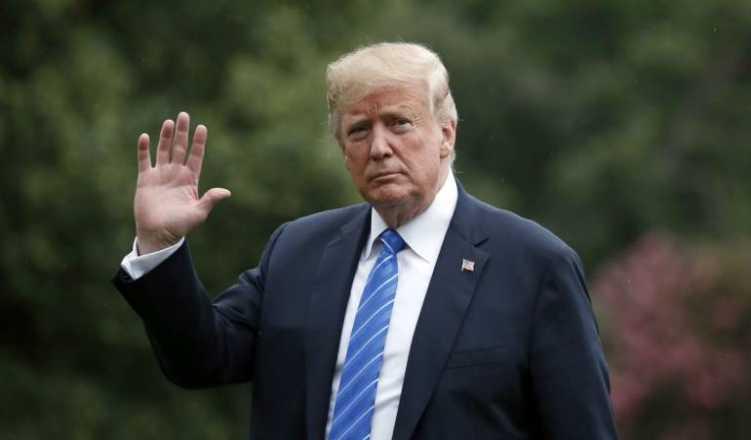Trump’s ‘Plan’ Is Simply to Make the Virus and Its Casualties Disappear

When schoolchildren across the United States began their summer break, President Donald Trump had more than two months to bring the coronavirus crisis under control in time for schools to reopen for the fall. But, instead of tackling the virus’ spread head-on, he did what most observers expected of him: he politicized the pandemic and acted as though he were the sole victim of the virus. If Trump’s message can be distilled into a single idea, it is that if we simply do not acknowledge that the virus is ravaging the nation, we can go about with business as usual and re-elect Trump in November.
Unfortunately for Trump, that plan is so far not quite working, and even pollsters biased in his favor are showing a grim election outcome for the president. But Trump’s loss is not necessarily our gain. Americans are dying from the coronavirus at a rate not seen in any other part of the world. The Washington Post points out that, “If you adjust per capita, then, Florida’s outbreak is currently about 70 times worse than that of the worst-hit country in Europe.”
The most infuriating aspect of the American response to the coronavirus is that other nations have clearly laid out a commonsense strategy that has worked so much better for them—enabling them to return to as much of a pre-pandemic “normal” as is possible under the circumstances. A prime example is Germany, where schools have been partially open with some online and some in-person instruction and remain responsive to outbreaks that may occur.
Jens Spahn, Germany’s federal minister of health, explained that the country’s robust health care system is a large part of the nation’s success story, saying, “the German health-care system was in good shape going into the crisis; everyone has had full access to medical care. This is a merit not just of the current government but of a system that was built over the course of many governments.” Contrast this with the United States, where there is no actual health care that covers everyone. Instead, there are patchwork systems that are linked to age, disability, income, and employment. It is no wonder then that health outcomes depend on many of the same factors.
Like the United States, Germany had the advantage of time in preparing for the pandemic in February and March as it spread like wildfire through Wuhan, China, and then Italy, offering cautionary lessons. Unlike the United States, Germany’s central government actually mobilized its laboratories to begin producing tests at a rapid rate. Under Trump’s oversight, the United States’ failure to do the same has been deemed “tragic.” As far back as March of this year, reports point out that the White House’s coronavirus task force, “typically devoted only five or 10 minutes, often at the end of contentious meetings, to talk about testing.”
Germany’s health minister explained, “Extensive testing is like pointing a flashlight in the dark: without it, you can see only shades of grey; but with it, you can see details clearly and immediately. And when it comes to a disease outbreak, you can’t control what you can’t see.” Trump realized this, and because he has no intention of controlling the virus, he railed against seeing it—openly. At his first political rally since the pandemic began, he told his adoring supporters, “I said to my people, ‘Slow the testing down please.’” Later he explained that he wasn’t kidding.
Spahn spoke of the need for public trust, saying, “it is critical that governments inform the public not just about what they know, but also about what they do not know. That is the only way to build the trust needed to fight a lethal virus in a democratic society.” But the United States’ right-wing media industry and profit-driven social media platforms have built themselves on selling mistrust through conspiracy-laden clickbait. Trump has built his presidency on lies. It is no wonder that in the moment when the ability to tell fact from fiction was needed the most, the United States has spectacularly failed.
“In Germany, we have succeeded in slowing the spread of the virus because the vast majority of citizens want to cooperate, out of a sense of responsibility for themselves and others,” said Spahn. Contrast that with the United States, where right-wing ideology is based on selfishness, individual “liberties,” white supremacy, and an unfounded fear of “government tyranny.” The internet is full of viral videos of Americans refusing to wear masks in grocery stores or at the dentist’s office—not because they necessarily disagree with the protection it offers to everyone, but because they do not like being told what to do.
Germany’s example illustrates that the infrastructure and approach needed to fight the virus is directly at odds with the rightward march in America. Our failure in managing to fight the virus began not in March, but back to Ronald Reagan’s presidency. Trump’s presidency was just the latest—perhaps mortal—wound in America’s self-inflicted death by a thousand cuts.
We ought to be outraged over what Trump and America’s right wing have wrought. But three and a half years of relentless outrage has left us weary and numb to the horrors of Trumpism. Only a handful of prominent figures are calling on Trump to resign, including his own niece. Contrast that with the chorus of demands for resignations from the Republican Party aimed at Barack Obama’s administration over various feigned outrages.
If something positive is to emerge from this ghoulish nightmare of deliberately enabling mass deaths, it ought to be a final nail in the coffin of American conservatism. A public health crisis cannot be fought with rugged individualism. While many Americans now say they regret voting for Trump in 2016, the more important mass regret ought to be over decades of conservative policies that stood in the way of tackling real crises and decimating existing public services. The death of Trump’s career needs to coincide with the death of Trumpism as a whole.
Trump’s plan for the coronavirus is to have no plan because to a significant percentage of Americans, having a plan would be akin to tyranny. So, if there is a plan, it is to make the virus go away—not in reality but from our view.
Trump has repeatedly told Americans that the virus would simply go away—like magic. Now, he has even taken steps to control hospital data on the virus, just like the sleight of hand that a magician requires in order to perform an illusion. The trick is to manage the illusion until the November election. Perhaps Americans—with all our lives at stake—can instead make Trump and Trumpism vanish in November as the first step in a long-overdue remaking of America.
Author Bio: Sonali Kolhatkar is the founder, host and executive producer of “Rising Up With Sonali,” a television and radio show that airs on Free Speech TV and Pacifica stations.
This article was produced by Economy for All, a project of the Independent Media Institute.
Get the latest reports & analysis with people's perspective on Protests, movements & deep analytical videos, discussions of the current affairs in your Telegram app. Subscribe to NewsClick's Telegram channel & get Real-Time updates on stories, as they get published on our website.
























